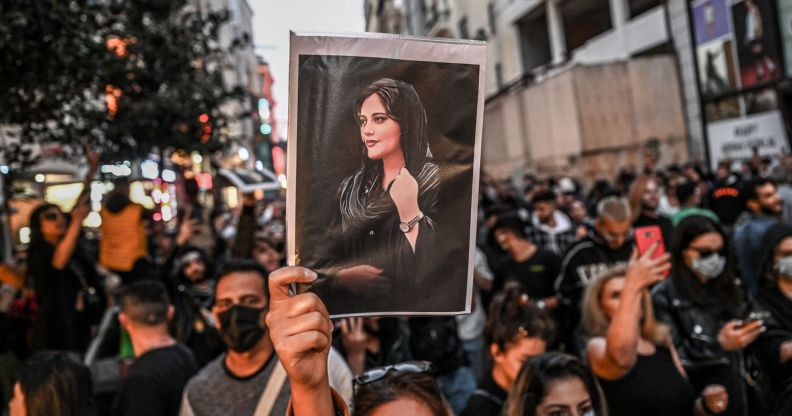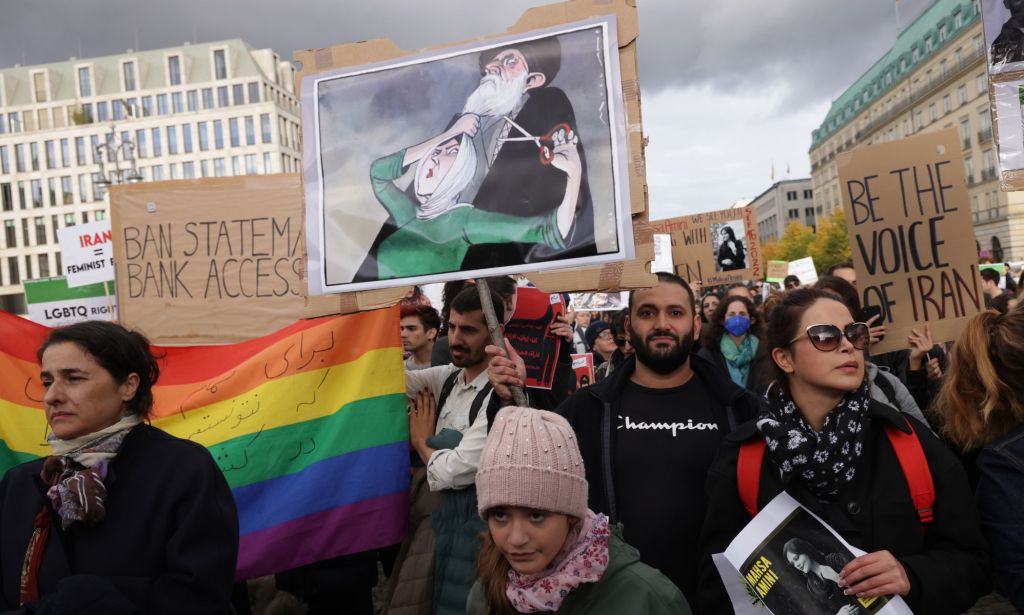How queer Iranians are fighting back against the country’s online LGBTQ+ crackdown

In the wake of Mahsa Amini’s death, Iran’s government shut down online resources that protestors used to share their stories. The Iranian Diaspora Collective wants to make sure that doesn’t happen again. (Getty Images)
In the wake of Mahsa Amini's death, Iran's government shut down online resources that protestors used to share their stories. The Iranian Diaspora Collective wants to make sure that doesn't happen again. (Getty Images)
As thousands protested the death of Mahsa Amini, Iran repeatedly shut down internet connections to curb the uprising led by women and LGBTQ+ people.
Iranians have fiercely and relentlessly protested against their government since the death of Amini in September 2022. The 22-year-old Kurdish-Iranian woman died while in the custody of the ‘morality police’, who arrested and beat her for alleged “inappropriate attire”.
Women, LGBTQ+ folks, young people and other marginalised groups led demonstrations across the country against the restrictive laws put in place by Iranian authorities.
Now, the Iranian Diaspora Collective (IDC) – a non-partisan, queer-led, multi-faith group – is helping protestors secure online access to keep the fight for their human rights going.
They used social media to show the world the brutality of the crackdown by security forces and the Iranian government.
Authorities used deadly violence, facial recognition technology and internet shutdowns in an attempt to extinguish the protests – but Iranian citizens have remained resilient.
The IDC knows the power of using social media and the internet to amplify the voices of LGBTQ+ people inside Iran who want to end the dictatorial regime. This is why they launched the ‘Connectivity is a Human Right: Keep Iran Online’ initiative on the first anniversary of the protests to help Iranian people connect and share their stories with the world.
The initiative was born with the advice of Yasmin Green, CEO of Jigsaw, a Google company whose mission includes promoting technological aid to people in authoritarian states.
Funds raised through the project will provide a VPN (virtual private network) service, which protects internet connection and privacy online, in Iran to stop the government shutdowns.
Nicolette Mason, co-founder of IDC, says the day-to-day situation on the ground in Iran has shifted in the last year, as daily protests and the “amount of aggression in the streets” have eased.
In large part, this is due to the “absolute escalation of violence and terrorism at the hands” of Iranian authorities and the government through executions, kidnapping, torture and the “disappearing” of dissidents.
But Mason says the “movement has not gone away”. Rather, the “strategy has just changed”.
“The tactics of protestors and organisers on the ground have changed because there are real concerns,” she says.
“Because the media attention has been pulled back, it’s a lot easier for the regime to get away with their cruelty without that focus on what is happening every day.
“This isn’t something that just started in September 2022 with the murder of [Mahsa] Amini.
“It is something that has been happening for the over 44 years that the Islamic Republic has been in power and has been an occupying government in Iran.
“This was a spark and a tipping point.”
Young Iranians want to ‘live freely like the rest of the world’
Mason highlights how Iran is a “very interesting” country with a large youth population that is “extremely tech savvy” and is keyed into the power that social media can give to their fight for freedom.
“Obviously, a lot of the internet is censored and throttled, and there are restrictions on what can be accessed,” Mason says.
“But the same way that youth here are getting on TikTok and watching the same trend, they are in Iran as well.
“All they want is to be able to live freely like the rest of the world.
“And what this movement is at its core – I know the media and definitely the regime wants to make it about the compulsory hijab – is about human rights.
“It is about an intersectional belief and understanding of what human rights, women’s rights, LGBTQ+ rights, labour rights and also environmental rights encompass.
“I think that is so profound because it’s rare to see in other cultural movements and cultural revolutions, where there is this real commitment to fighting for all marginalised people.”
Iran’s regime actively persecutes and discriminates against LGBTQ+ people. Same-sex sexual intercourse is criminalised, and people found guilty of engaging in it face severe punishments, including execution.
Additionally, the Iranian legal system offers no protections for LGBTQ+ people, who are forced to hide their sexual orientation and gender identity to avoid arrest, imprisonment, abuse and death.
There are also reports that queer youth are forced to undergo brutal conversion therapy in Iran.

VPNs are critical for bypassing the Iranian government’s internet shutdowns and shining a light on the human rights atrocities that are being committed in the country.
Like Iran, Russia and China have also actively worked on ways to cut off citizens from the rest of the world by restricting access to the internet. This includes closing down LGBTQ+ accounts online and restricting the social media platforms that queer folks use to find community.
The IDC initiative will also look at how activists in the country can innovate VPN capabilities to stop government censorship. It will also forge a roadmap on tech infrastructure needed to prevent future shutdowns, ensuring sustainable connectivity in Iran.
Beyond donating to the initiative, Mason says people worldwide can bring about positive change for LGBTQ+ people in Iran by using their online presence for good.
She cites how people worldwide raised awareness for Sareh Mansouri (also identified as Zahra Seddiqi Hamedani) and Elham Choobdar, two LGBTQ+ activists who were sentenced to death in September last year and were later released from prison.
“It’s inspiring to know that, when people care, when LGBTQ people everywhere sign on and feel like they do have agency and being able to advocate for people in Iran that we can make an actual tangible difference that is powerful,” Mason says.
“It is inspiring, and it’s incredibly motivating to not just doom scroll and be like, ‘Oh, this is so horrible. I can’t do anything about it.’
“We all have a social media account somewhere.
“We all do have the power to be able to impact people’s lives in a material way. That’s incredible.”

